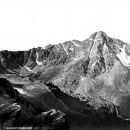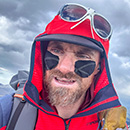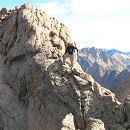^this is the best answer.
What's the best type of training?
Forum rules
- This is a mountaineering forum, so please keep your posts on-topic. Posts do not all have to be related to the 14ers but should at least be mountaineering-related.
- Personal attacks and confrontational behavior will result in removal from the forum at the discretion of the administrators.
- Do not use this forum to advertise, sell photos or other products or promote a commercial website.
- Posts will be removed at the discretion of the site administrator or moderator(s), including: Troll posts, posts pushing political views or religious beliefs, and posts with the purpose of instigating conflict within the forum.
-
Dave B

- Posts: 2419
- Joined: 6/14/2010
- Trip Reports (9)
Re: What's the best type of training?
Make wilderness less accessible.
Re: What's the best type of training?
Traveling light is the only way to fly.
IG: @colorado_invasive
Strava: Brent Herring
IG: @colorado_invasive
Strava: Brent Herring
-
Barnold41

- Posts: 329
- Joined: 9/8/2016
- 14ers: 15
- 13ers: 12
- Trip Reports (0)
Re: What's the best type of training?
Stair climbers ](./images/smilies/eusa_wall.gif)
-
madbuck

- Posts: 1016
- Joined: 6/16/2009
- Trip Reports (6)
Re: What's the best type of training?
I hadn't seen it mentioned, but I like/recommend "TFTUA" (Training for the Uphill Athlete). I haven't read TFTNA (mostly by the same authors); and, I'm not an alpinist!
Much of the 14er'ing is here is hiking.
While TFTUA is also built for competitive athletes (even at an amateur level), the fundamentals are there and I think the vignettes throughout are interesting.
-
justiner

- Posts: 4689
- Joined: 8/28/2010
- 14ers: 3 1
- Trip Reports (37)
Re: What's the best type of training?
(Scott Johnston and Steve House: the authors of TFTNA. Bunch a old farts).
Long May You Range! Purveyors of fine bespoke adventures
-
wineguy

- Posts: 359
- Joined: 7/12/2009
- 14ers: 58 3
- 13ers: 164
- Trip Reports (8)
Re: What's the best type of training?
Since this thread has contained some negative comments about TFTNA, I'd like to offer an alternative opinion. First, the book is 400+ pages so attempts to summarize with a few brief sentences will not do it justice. One limitation is that it is not targeted at 14er peak baggers, but at those attempting far more challenging and risky alpine adventures. Nevertheless, I think it contains useful info for those of us with more limited goals. The book helps me think about my body as a living machine, and how the various components of that machine are important in athletic performance, including long days in the mountains. I have "bonked" a couple of times on climbs, and the book has given me insight into thinking about these episodes. I don't think the training regimens in the book are particularly relevant for my level of activity, but have found the book very interesting for understanding my limitations. What you can learn from the book will of course depend on your current level of knowledge. I found the discussion of "fast-twitch" vs. "slow-twitch" muscles especially interesting, though it mostly reinforced what we already know: "the best training activity for climbing in the mountains is climbing in the mountains." I agree that the book may not be particularly interesting for the super-athletes who can dash up and down the mountains. But for those who are pushing their physical limits on CO mountains, I think the book will help you think about ways to expand those limits.
Last edited by wineguy on Mon Jan 11, 2021 7:05 pm, edited 1 time in total.
"Eventually, all things merge into one, and a river runs through it. The river was cut by the world's great flood and runs over rocks from the basement of time. On some of the rocks are timeless raindrops. Under the rocks are the words, and some of the words are theirs. I am haunted by waters." - Norman Maclean
Re: What's the best type of training?
This is probably my biggest issue with it - not the content but the people trying to apply it. If you're a bleeding-edge alpinist trying to put up big routes, it's great - but those people probably know what they're doing with training to not need the book. If you aren't that alpinist it's needlessly complex (like most training plans for most sports) and specific, and detrimental to being the best human specimen you can be with the level of specificity.
And I'm not now, nor have I ever been, a crossfitter.
"There are no hard 14ers, but some are easier than others." - Scott P
http://throughpolarizedeyes.com
http://throughpolarizedeyes.com
-
cougar

- Posts: 1196
- Joined: 8/9/2007
- 14ers: 58 2
- 13ers: 142 2
- Trip Reports (10)
Re: What's the best type of training?
Be sure to grow a scraggly mountain man beard, all the elite mountaineers, ultrarunners, and goats sport them.
I found benefits cross training with weights for strength and core, helps with endurance and recovery. Although you can overtrain and stay sore. Core is important for balance, scrambling, and carrying a pack. Push and pull exercises.
Getting in the hills frequently is still great for sustained hills and acclimation. Running and cycling doesn't seem to help me on the mountain, actually wears me down more.
I found benefits cross training with weights for strength and core, helps with endurance and recovery. Although you can overtrain and stay sore. Core is important for balance, scrambling, and carrying a pack. Push and pull exercises.
Getting in the hills frequently is still great for sustained hills and acclimation. Running and cycling doesn't seem to help me on the mountain, actually wears me down more.
http://www.listsofjohn.com/m/cougar
"If we don't change direction, we'll end up where we're going."
"Bushwhacking is like a box of chocolates - you never know what you're gonna get."
"Don't give up on your dreams, stay asleep"
"If we don't change direction, we'll end up where we're going."
"Bushwhacking is like a box of chocolates - you never know what you're gonna get."
"Don't give up on your dreams, stay asleep"
-
pvnisher
- Posts: 1747
- Joined: 9/28/2006
- Trip Reports (8)
Re: What's the best type of training?
Haven't seen a lot of discussion on diet.
Of course that will devolve into diatribes between the various camps in which is best, but the bottom line is that the less fat you have, the better you'll perform.
And if you have the right amount of muscle for the tasks (not too much, not too little), you'll perform better.
I was watching a GCN episode where three cyclists rode a hill in 6:30. The lighter two put out an average of 380w. The largest rider had to put out 480w for the same hill at the same pace. That's massive.
When I was trying to get back to 20+ pullups I had to drop about 3 pounds. And it's easier to drop weight than it is to get stronger, but the effect is the same (in bodyweight exercises).
The same principle we apply to our packs we very rarely apply to our bodies. We'll spend money to drop 5oz in pack weight but don't consider the extra pounds we're carrying.
Additionally, I've found when I am intentional in my eating I'm more intentional in my training and vice versa since I don't want to sabotage either effort. And that's where the real improvement happens, whatever your goals may be.
Of course that will devolve into diatribes between the various camps in which is best, but the bottom line is that the less fat you have, the better you'll perform.
And if you have the right amount of muscle for the tasks (not too much, not too little), you'll perform better.
I was watching a GCN episode where three cyclists rode a hill in 6:30. The lighter two put out an average of 380w. The largest rider had to put out 480w for the same hill at the same pace. That's massive.
When I was trying to get back to 20+ pullups I had to drop about 3 pounds. And it's easier to drop weight than it is to get stronger, but the effect is the same (in bodyweight exercises).
The same principle we apply to our packs we very rarely apply to our bodies. We'll spend money to drop 5oz in pack weight but don't consider the extra pounds we're carrying.
Additionally, I've found when I am intentional in my eating I'm more intentional in my training and vice versa since I don't want to sabotage either effort. And that's where the real improvement happens, whatever your goals may be.
-
ezabielski

- Posts: 738
- Joined: 7/13/2012
- 13ers: 8
- Trip Reports (0)
Re: What's the best type of training?
For 14ers, TFTNA is simply not the target activity, so I am surprised it is being much discussed here. Walking up 14ers, maybe doing a bit of scrambling, usually in a day trip, is not alpinism. Their other book, Training for the Uphill Athlete, addresses the more general case, mostly geared towards trail/mountain running.
Me? I find running up Green Mountain a few hundred times is good training. Or walking across the country. Between those two things you're pretty much set to walk uphill.
Me? I find running up Green Mountain a few hundred times is good training. Or walking across the country. Between those two things you're pretty much set to walk uphill.
-
sigepnader

- Posts: 215
- Joined: 10/17/2011
- 14ers: 22
- 13ers: 52 1
- Trip Reports (0)
Re: What's the best type of training?
CrossFit three days a week, weight training three days a week - a lot of lunges, squats, deadlifts, planks, and I’ll ride my spin bike thirty minutes every night before bed.
And if you’re old..stretch.
And if you’re old..stretch.
-
Marmot72

- Posts: 433
- Joined: 9/2/2007
- 14ers: 58 2
- 13ers: 626 17
- Trip Reports (43)
Re: What's the best type of training?
All I will add is variety. Over sustained years, variety is helpful, to avoid developing muscular imbalances, which becomes much more important as one ages. I primarily alternate jogging and cycling, and various weight-lifting routines.
I'm a terrible swimmer, but I've always thought swimming would be an excellent activity, because of the combination of exertion and holding breath. Lemke was a collegiate swimmer, if I recall, and I'd say he's none too shabby in the hills. My sole time hiking with him, in spring snow, was the day after he had done a multi-peak outing and only slept maybe 4 hours afterward.
-Steve
I'm a terrible swimmer, but I've always thought swimming would be an excellent activity, because of the combination of exertion and holding breath. Lemke was a collegiate swimmer, if I recall, and I'd say he's none too shabby in the hills. My sole time hiking with him, in spring snow, was the day after he had done a multi-peak outing and only slept maybe 4 hours afterward.
-Steve
I have phenomenal route-finding abilities. Specifically, I have an uncanny knack for selecting the path of most resistance.


